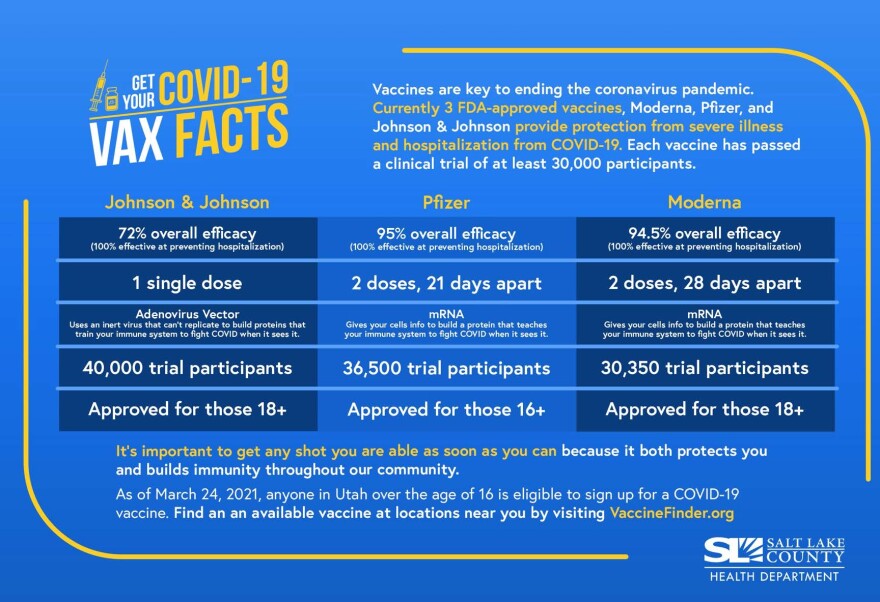All Utahns 16 and older are now eligible for a COVID-19 vaccine. The state is currently distributing the two-dose Moderna and Pfizer vaccines, but has temporarily halted the Johnson & Johnson single-dose vaccine as the federal government reviews data around six reported cases of a rare and severe type of blood clot .
People who have tested positive for COVID-19 are now encouraged to sign up for a vaccine. However, they should wait until they no longer have symptoms from their infection and have been released from quarantine.
Utahns can go to any county within the state to get a vaccine. Gov. Spencer Cox cautioned that people will be required to return to that same location for their second Pfizer or Moderna doses. Local health department information and registration for vaccine appointments is available at coronavirus.utah.gov/vaccine-distribution or the CDC’s vaccinefinder.org.
The Utah Department of Health is partnering with private healthcare providers to help distribute the vaccine. University of Utah Health, Nomi and Intermountain will help administer first and second doses of the Moderna and Pfizer vaccines, as well as the single-dose J&J vaccine.
Local health districts are also handling distribution. Utahns can sign up through their local health departments.
Organizations are required to distribute their vaccines within a week of receiving it. If they don't, their inventory will be reduced, “and extra doses will be taken and redistributed,” Cox said.
The idea is to administer the vaccine quickly in order to qualify for more from the federal government, speeding up the timeline for everyone.
Safety And Effectiveness
Vaccines from Pfizer, Moderna and Johnson & Johnson have been approved for emergency use by the Federal Drug Administration. Clinical trials found the Pfizer and Moderna vaccines to be close to 95% effective at preventing patients from developing COVID-19 symptoms after two doses, given 21 and 28 days apart, respectively.
The Utah Department of Health has started distributing the J&J vaccine again. The state had paused its distribution after reports from the Centers for Disease Control and Prevention that it caused blood clots in some patients. Health officials say although clotting is extremely rare, they will take safety precautions.
Despite concerns from some people that the J&J vaccine has a lower rate preventing moderate illness than the other vaccines, health officials said what’s more important is its rate of preventing severe illness and death. Officials said the new vaccine is on par with the other shots, and people should not turn down the chance to take the J&J shot.

There are short-term side effects expected with each vaccine — things like fatigue, pain where the shot was given or a low fever — some of which have reportedly been pretty severe in some patients. But infectious disease specialist Dr. Joel Trachtenberg said those are normal reactions and signs the body is priming itself to protect from the virus.
The potential long-term side effects aren’t really known, given the quick timeline, but Trachtenberg said vaccines in general are incredibly safe and historically have been the best way to control the spread of harmful viruses.
Should You Take It?
The Centers for Disease Control and Prevention recommends that everyone get the vaccine, even if they are at high risk for serious complications or have already had COVID-19. Preliminary studies show the vaccines are effective against the variants of virus but more research is still being done.
Dr. Anthony Fauci said that somewhere between 70-90% of the U.S. would need to get vaccinated in order to develop herd immunity, when enough of the population is immune to a disease that those who are not are still protected.
And while some people may be skeptical of the vaccine, Dr. Eddie Stenehjem, an infectious disease specialist with Intermountain Healthcare, said the science is sound.
“We all feel that this vaccine is safe and effective,” he said. “We feel that this vaccine needs to be deployed in our health care settings and in our communities as soon as possible.”
Salt Lake County health officials said the science isn’t yet clear on how long immunity lasts after vaccination and it’s possible boosters are needed months or years later.





